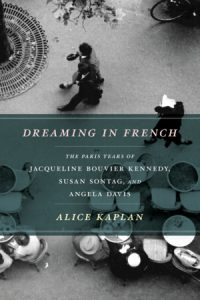Book Group Guide
The questions that follow are intended to enhance your group’s reading and discussion of DREAMING IN FRENCH by Alice Kaplan
Questions for reading group
1. Dreaming in French tells the story of three very different women who in their lifetimes became American icons. Do you think they still have power as models for young women growing up today?
2. Jacqueline Bouvier, Susan Sontag and Angela Davis had very different fantasies and desires about France. How were those fantasies and desires connected to their American lives?
3. Is France still a dream destination—does it still have the power to delight and captivate women that it did in the 1950s and 1960s?
4. With all our new communication technologies—email, skype, texting—has it become impossible to immerse oneself in foreign culture with the intensity experienced by students in the 1950s and ’60s?
5. Being in France meant talking, thinking, reading, and writing in a foreign language. Does using a foreign language regularly like that–or being in a foreign country–have an effect on the way you present yourself and relate to your surroundings?
6. Paris has long been the capital of romance. Was love and its pursuit important for them during their time in France—any more so than for any young woman in her early twenties?
7. Do you think that a young person today could still find traces of the very different Paris that Kennedy, Sontag, and Davis enjoyed? Would it still be so foreign and different, or have movies, TV, and the Internet brought French and American culture closer together?
8. Paris in the 1950s and ’60s was still marked by, and carrying the memories of, World War II. Do you think today’s Paris would still show traces of that traumatic experience, or has enough time passed that it has been forgotten
9. If you could talk with these three women, what questions would you ask them?
10. If you could have dinner with any of the three, who else would you invite to fill out your table?
Questions about Jacqueline Bouvier Kennedy
1. Jackie, more than the other women, seems to have taken from her time in Paris a general sense of a uniquely French approach to life. How did that manifest itself in her later life?
2. Jackie kept in touch with a number of people she met when she was a student abroad. What would it be like to have someone you’d known so young ascend to such heights of politics and society?
3. At midcentury, Paris was the center of world fashion, and Jackie in her White House years drew on the sense of style she encountered there. Do you think it would be difficult for a First Lady to express a similarly adventurous and international sense of style these days?
4. In her post–White House years, when she could simply have retired, Jackie threw herself seriously into a career as a book editor. What do you think that says about her character and her relationship to achievement?
Questions about Susan Sontag
1. Sontag was the oldest of the three women when she went to France, yet she was also perhaps the one most changed by her time there. Why do you think that is?
2. Sontag kept lengthy lists of French words and phrases as markers of her aspiration and aids in memorization. If you’ve learned another language, is that a technique that you’ve used and found helpful? Or does language depend too much on actual use and context for that to work well?
3. How was Sontag’s later approach to intellectual life, and intellectual combat, marked by her time in France?
Questions about Angela Davis
1. Angela Davis went from the Jim Crow South to Paris, which had the reputation among African American intellectuals and artists of being free from racism. The reality was more complicated than that—what aspects of racism and racial disharmony did she discover there that were different from the American experience?
2. Somewhat similarly to Susan Sontag, Angela Davis as a young woman cast France and the French language in an aspirational light. For a girl in her teens looking ahead to college and travel, what role can a language play in creating an imagined new self?
3. All around her when she was in Paris, Davis saw signs of a political activism—and radical politics—that were different from anything she’d seen in the States, and she took that new awareness back with her. Do you think politics, and student activism, are still very different between Europe and the United States today?

